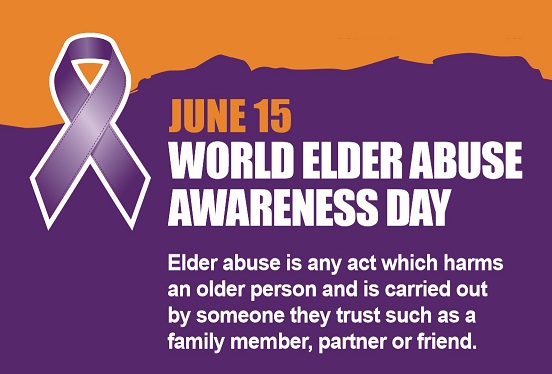With Dr. Uduak Morgan
The World Elder Abuse Awareness Day (WEAAD) happens every year on June 15th. It was officially recognized by the United Nations General Assembly in its resolution 66/127, December 2011, following a request by the International Network for the Prevention of Elder Abuse (INPEA), who first established the commemoration in June 2006. It represents the one day in the year when the whole world voices its opposition to the abuse and suffering inflicted to some of our older generations. The purpose of WEAAD is to provide an opportunity for communities around the world to promote a better understanding of abuse and neglect of older persons by raising awareness of the cultural, social, economic and demographic processes affecting elder abuse and neglect.
Elder abuse can be defined as “a single, or repeated act, or lack of appropriate action, occurring within any relationship where there is an expectation of trust which causes harm or distress to an older person”. The abuse of an elderly person is either an act of commission or omission.
Elder abuse is an important public health and societal problem that exists in both developing and developed countries, yet it is typically hidden and underreported globally. It occurs irrespective of gender, race, income, culture or social strata. Prevalence rates or estimates exist only in selected developed countries, ranging from 1% to 10%. Although the extent of elder mistreatment is unknown, its social and moral significance is obvious. Until recently, this serious social problem was hidden from the public view and considered mostly a private matter. In many parts of the world elder abuse occurs with little recognition or response. Even today, elder abuse continues to be a taboo, mostly underestimated and ignored by societies across the world.
With a growing global population of elderly people, and as longevity increases, abuse of the elderly is an increasing and serious problem that affects health and human rights and can even cause death. It is therefore vital to raise awareness of it and thus prevent it whenever and wherever possible.
Elder abuse comes in many forms including physical, emotional, sexual, financial abuse, exploitation and neglect. Elder physical abuse is the intentional use of force against an elderly person that leads to physical harm which ranges from physical pain and injuries to death. It involves hitting, pushing, restraints and confinement of the elderly person. The signs of physical violence are broken bones, bruises, burns, sprains and tooth loss, among others. Elder sexual abuse is the forced or unwanted sexual interaction of any kind with an older adult. It includes any sexual contact with an elder who has dementia, Alzheimer’s (a kind of mental disorder), or another disability that prevents them from consenting to a sexual act.
Psychological and emotional elder abuses are intentional acts that impose mental pain, fear, or distress on an elder. They range from barring access to resources, humiliation, insults, intimidation, isolation, name-calling and threats, among others. Elder neglect is when a caregiver fails to protect an elder from harm or doesn’t meet an elder’s needs in a way that results in or risks serious injury. It is believed to be the commonest form of elder abuse. Examples of elder neglect include failure to adequately provide: basic daily living activities or shelter, clothing, hygiene upkeep, medical care, nutrition and hydration and protection from danger, among others. Elder abandonment is when someone who assumes care of an elderly person intentionally deserts them. They may leave them at a hospital or nursing homes or long-term care facilities.
The effects of these forms of abuse ranges from physical injuries, emotional and psychological disturbances such as depression, anxiety, fear, sleep and eating disorders, decreased social contacts, loss of interest in self, suicidal ideations and in extreme cases, death.
Elderly people are particularly vulnerable to abuse because they are unable to defend themselves and get help. Fear and infirmity can be major barriers to seeking and getting help. Again, spotting and challenging abuse in the elderly isn’t easy as some are isolated, having outlived family and friends. Some are abused in institutions where abuse is not spotted or is covered up, and in some cases the elderly are not given priority by authorities in abuse matters.
The approaches to define, detect and address elder abuse need to be placed within a cultural context and considered alongside culturally specific risk factors. For example, in some traditional societies, older widows are subjected to forced marriages while in others, older men and women are accused of witchcraft. From a health and social perspectives, unless both primary health care and social service sectors are well equipped to identify and deal with the problem, elder abuse will continue to be under diagnosed and overlooked.
This year’s theme “Access to Justice” serves as a reminder of the importance to fully address the needs of older persons who may seek recourse. Older persons who have experienced situations of violence, abuse and neglect often face multiple barriers in accessing judicial remedies such as issues of accessibility, affordability, reasonable accommodation, excessive delays and backlogs in judicial processes, impact of digitalization, cultural norms, gender bias, discrimination, and entrenched ageism in policy, norms and practices.
Access to Justice impacts older persons’ ability to fully exercise all their human rights including the right to health, adequate social protection and to live in dignity. The preservation or restoration of dignity and respect for older persons is crucial in such situations.
Access to justice is also a core element of the rule of law, a fundamental right in itself and an essential prerequisite for the protection and promotion of all other human rights. It encompasses the right to a fair trial, including equal access to and equality before the courts, and seeking and obtaining just and timely remedies for rights violations. This year’s event will address these issues and help explore standards for the protection of older persons against violence, neglect and abuse. Elderly people are humans and deserve the same dignity and respect as people of all other age groups. On this World Elders Abuse Awareness Day let all take a stand against elder abuse and denial of their human rights and dignity!
Dr. Uduakobong Morgan is a Family Physician with special interest in Elderly care. She practices at the University of Uyo Teaching Hospital.
 Newsfront Online …Telling the Public as it is
Newsfront Online …Telling the Public as it is




